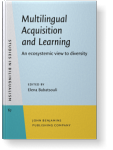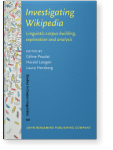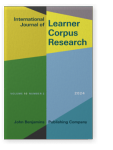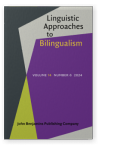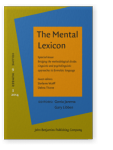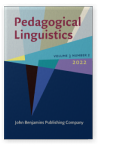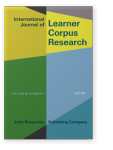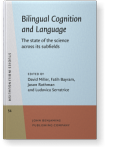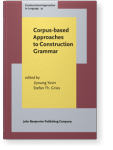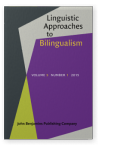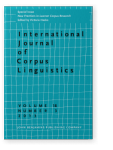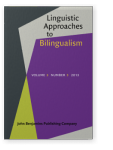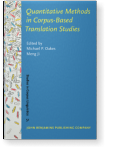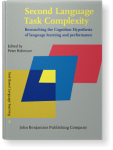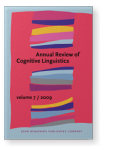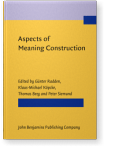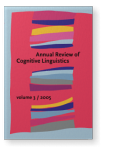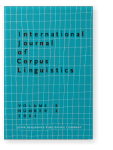Stefanie Wulff
List of John Benjamins publications for which Stefanie Wulff plays a role.
Book series
Journals
ISSN 2215-1478 | E-ISSN 2215-1486
ISSN 1879-9264 | E-ISSN 1879-9272
Title
Bridging the Methodological Divide: Linguistic and psycholinguistic approaches to formulaic language
Edited by Stefanie Wulff and Debra Titone
Special issue of The Mental Lexicon 9:3 (2014) v, 126 pp.
Subjects Computational & corpus linguistics | Multilingualism | Neurolinguistics | Psycholinguistics | Semantics
2022 Some thoughts on the future of data-driven learning in research and instructional practice Pedagogical Linguistics 3:2, pp. 187–192 | Commentary
2019 Intensifying constructions in French-speaking L2 learners of English and Dutch: Cross-linguistic influence and exposure effects International Journal of Learner Corpus Research 5:1, pp. 63–103 | Article
We investigate the cross-linguistic influence and the (longitudinal) impact of Content and Language Integrated Learning (CLIL) on the acquisition of intensifying constructions, using corpora of written French, Dutch, and English productions by L1 speakers, and L2 English and L2 Dutch produced by… read more
2018 Chapter 3. Usage-based approaches to second language acquisition Bilingual Cognition and Language: The state of the science across its subfields, Miller, David, Fatih Bayram, Jason Rothman and Ludovica Serratrice (eds.), pp. 37–56 | Chapter
We present an overview of the cognitive underpinnings of usage-based approaches to second language acquisition (L2A). Not all constructions are equally learnable, even after years of (frequent) exposure. We present a usage-based analysis of this phenomenon in terms of fundamental principles of… read more
2016 A corpus-based study of infinitival and sentential complement constructions in Spanish Corpus-based Approaches to Construction Grammar, Yoon, Jiyoung and Stefan Th. Gries (eds.), pp. 145–164 | Article
This corpus-based study examines Spanish infinitival and sentential complement
constructions. 561 infinitival and 795 sentential complements retrieved
from the AnCora corpus were subjected to a Distinctive Collexeme Analysis
(Gries and Stefanowitsch, 2004) that identified the verbs distinctively… read more
2015
This study presents a contrastive analysis of 3624 instances of prenominal adjective order retrieved from the Chinese and German sections of the International Corpus of Learner English and the International Corpus of English. The data was annotated for nine determinants of adjective order,… read more
2014 Introduction to the Special Issue: Bridging the methodological divide: Linguistic and psycholinguistic approaches to formulaic language Bridging the Methodological Divide: Linguistic and psycholinguistic approaches to formulaic language, Wulff, Stefanie and Debra Titone (eds.), pp. 371–376 | Article
2013 The genitive alternation in Chinese and German ESL learners: Towards a multifactorial notion of context in learner corpus research New Frontiers in Learner Corpus Research, Hasko, Victoria (ed.), pp. 327–356 | Article
This paper exemplifies an approach to learner corpus data that adopts a multifactorial definition of ‘context’. We apply a logistic regression to 2,986 attestations of genitive alternation (the squirrel’s nest vs. the nest of the squirrel) from the Chinese and German sub-sections of the… read more
2012 Regression analysis in translation studies Quantitative Methods in Corpus-Based Translation Studies: A practical guide to descriptive translation research, Oakes, Michael P. and Meng Ji (eds.), pp. 35–52 | Article
This paper provides an overview of how to compute simple binary logistic regressions and linear regressions with the open source programming language R on the basis of data from the INTERSECT corpus of English texts and their French and German translations. First, we show how one of the key… read more
2011 Chapter 3. Corpus-driven methods for assessing accuracy in learner production Second Language Task Complexity: Researching the Cognition Hypothesis of language learning and performance, Robinson, Peter (ed.), pp. 61–88 | Chapter
Adopting the perspective of Ellis’s (2007) Associative-Cognitive CREED, this chapter proposes a measure of accuracy in learner production that is based on conditional probabilities. More specifically, we develop a definition of accuracy that involves ‘the proficient selection of constructions in… read more
2009 Psycholinguistic and corpus-linguistic evidence for L2 constructions Annual Review of Cognitive Linguistics: Volume 7, Ruiz de Mendoza Ibáñez, Francisco José (ed.), pp. 163–186 | Article
In Construction Grammar, highly frequent syntactic configurations are assumed to be stored as symbolic units in the mental lexicon alongside words. Considering the example of gerund and infinitival complement constructions in English (She tried rocking the baby vs. She tried to rock the baby), this… read more
2007 Brutal Brits and persuasive Americans: Variety-specifc meaning construction in the into-causative Aspects of Meaning Construction, Radden, Günter, Klaus-Michael Köpcke, Thomas Berg and Peter Siemund (eds.), pp. 265–281 | Article
“England and America are two nations divided by a common language.”(George Bernard Shaw)Adopting a construction-based view of language (Goldberg 1995), we demonstrate that it is possible to uncover differences between British and American English at the lexicosyntactic level, showing that the… read more
2005 Do foreign language learners also have constructions? Annual Review of Cognitive Linguistics: Volume 3, Ruiz de Mendoza Ibáñez, Francisco José (ed.), pp. 182–200 | Article
In Construction Grammar, the ultimate grammatical unit is the construction, a conventionalized form-meaning pairing. We present interrelated evidence from three different methods, all of which speak in favor of attributing an ontological status to constructions for non-native speakers of English.… read more
2003 A multifactorial corpus analysis of adjective order in English International Journal of Corpus Linguistics 8:2, pp. 245–282 | Article
This paper is concerned with the question of which factors govern prenominal adjective order (AO) in English. In particular, the analysis aims to overcome shortfalls of previous analyses by, firstly, adopting a multifactorial approach integrating all variables postulated in the literature, thereby… read more

